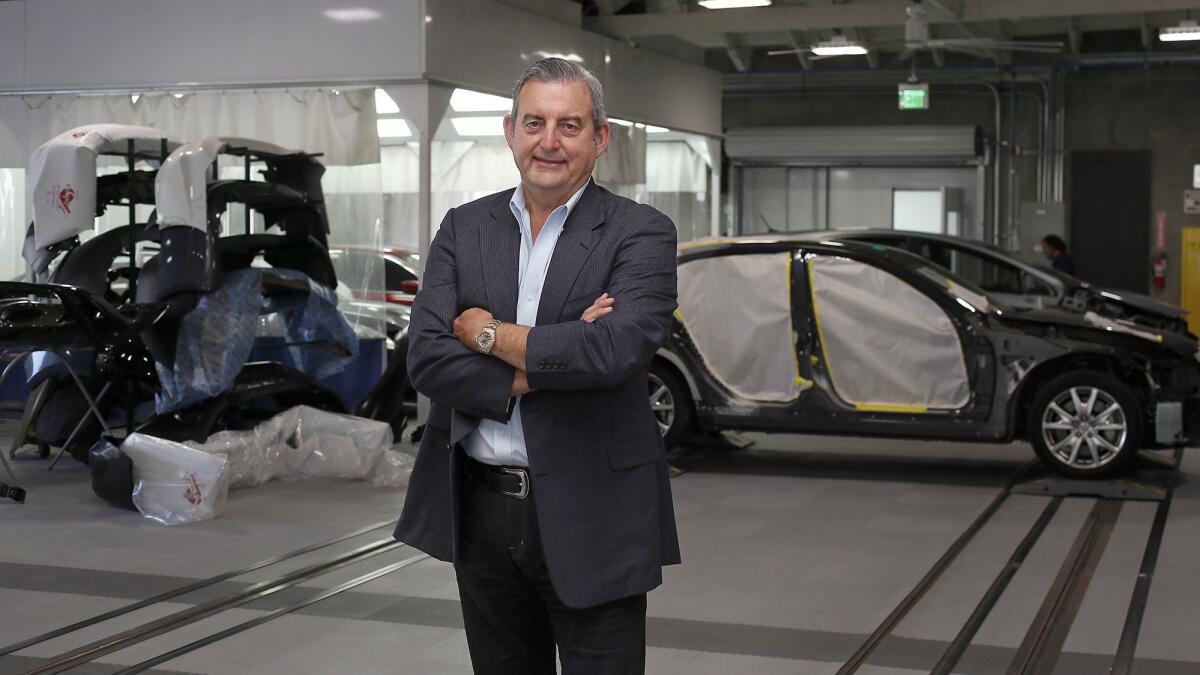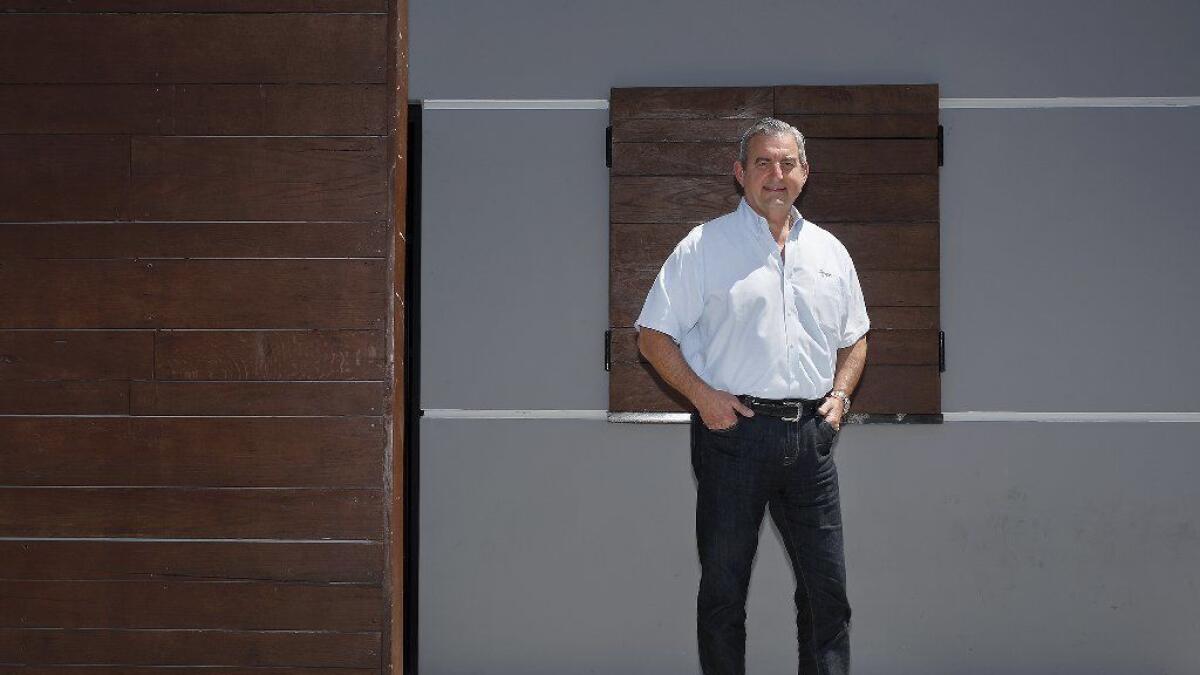The low-key Taorminas channeled their success in business into helping the homeless

On a night during one of the coldest Orange County winters in recent memory, activists and concerned residents crammed into the Anaheim City Council chambers for a special meeting.
The freshman council was set to consider erecting an emergency homeless shelter to stave off a likely cascade of homeless deaths due to large homeless encampments that had popped up in Maxwell and La Palma parks.
The project was spearheaded by Bill Taormina and other community members. Taormina, a wealthy Anaheim businessman and philanthropist, may have saved the project from demise that night.
“Please compare your vote to the value of a human life,” he told the council.
When council members seemed to be concerned with the possibility of a lawsuit from surrounding business owners, Taormina stepped up.
“They can come and sue me,” he told the council.
“Mr. Taormina, did I hear you suggest that you would reimburse the city for any legal fees we would encumber as a result of this project?” Councilman Jose Moreno asked.
“Yes, 100%,” Taormina said. “Put it in writing, and I will sign it tonight.”
Shielded from legal threats, the council authorized the 200-bed emergency shelter, which opened a few weeks later in mid-December.
Taormina said he has since paid a “substantial amount,” keeping his promise to the city.
“The city was going to back away, and I couldn’t let that happen,” Taormina said during a recent interview. “It was in the middle of the rainstorms in the winter and 100 people would have died in Maxwell Park.”
Taormina, 68, of Anaheim has played an integral role in the county’s fight to end homelessness in the last few years.
“Bill has worked tirelessly to address homelessness, an issue that cannot be solved by government alone,” said Anaheim Mayor Harry Sidhu. “For Bill, it is part of a long history of investing in Anaheim and being involved in the most critical social issues facing our city.”
Preferring to stay out of the limelight, Taormina can be seen in the back row at most any homeless-related meeting or shelter grand opening.
The origins of his drive to solve the most substantial issue facing Orange County lie in the history of his family, an Anaheim dynasty.
His father, Cosmo Vincent Taormina, left an abusive home in Northern California at age 14 and started working in the picking fields in the San Joaquin Valley, soon becoming a supervisor.
Eventually, he made his way south and began working at a restaurant on Catalina Island. He met his future wife, Arlene.
Arlene’s father, a garbage man, advised Cosmo to get a more stable job. He lent him a car to look for work in Santa Ana, but Cosmo never made it there. The car broke down near Anaheim City Hall. Cosmo walked in and asked if anybody needed a garbage man.
“The rest is history,” Bill said.
Cosmo founded Anaheim Disposal in 1949.
In its infancy, the company consisted of Cosmo lugging trash into the back of a tired, old truck while Arlene sat in the passenger seat keeping account of what houses they’d visited. But as the city grew, Cosmo realized he had to hire some employees.
Though it wasn’t nearly as prominent an issue as it is today, Anaheim had its share of homeless people dwelling in the alleyways. They became Cosmo’s first employees.
“He would see the people in the alleys — the folks who didn’t have any opportunity,” Bill said. “My father came from nothing, so he would always offer these gentlemen jobs.”
Bill got his first exposure to homelessness as a child while riding in the truck between his father and the formerly homeless employees.
“Ever since I was a young kid all I saw was people who were out of luck and needed to make their lives better,” Bill said. “My dad provided them those opportunities. Many of those folks became managers and some even corporate executives. They started off living behind a garbage can.”
Bill and his brother Vincent Taormina took over Taormina Industries in the early 1970s and grew it from a small Anaheim business to a regional one that served many Orange County cities — Brea, Placentia, Yorba Linda, Villa Park, Garden Grove and Fullerton among them — and some in the Inland Empire.
Cosmo died in 1984. Then in 1997 the company merged with Republic Industries, the nation’s second largest waste disposal company, for about $250 million in stock.
Like his father, Bill has always sought to give people a hand up, providing jobs to struggling individuals, including with his current company, Clean City Inc., which specializes in graffiti removal and power washing.
“To this day I still believe in that, and many of the folks on my staff have started with prison records and all that,” he said. “The reason is, they are the most resilient because they have already been to the bottom and they don’t want to go back. That opportunity is the thing that inspires me the most. That’s what brings a tear to my eye, being able to help someone and really bring a dramatic change in their life. I learned it from my dad. ”

Most of Bill’s time is currently spent searching for a solution for the county’s nearly 7,000 homeless people.
He negotiates locations and other logistics, speaks with neighbors of the shelters, meets with elected officials, attends city meetings and works with city staff and the principals of each shelter.
“I’m a tool in the toolbox for whatever is necessary, lending whatever expertise I have to help it get expedited,” Bill said.
He’s been involved with the openings of three homeless shelters in Anaheim. He works with the nonprofit Mind OC, which is opening a mental health facility in Orange; Housing is a Human Right OC; the Salvation Army; the affordable housing developer Jamboree Housing; the homeless service provider Illumination Foundation; and the 600-bed Salvation Army Center of Hope, which is expected to open in early 2021.
Back in 1987, he offered to cover the city of Anaheim’s cost of opening a 100-bed homeless shelter on North Anaheim Boulevard, though a fire snuffed out the plan.
“He’s been a strong advocate for the homeless in the community,” said Dave Duran, co-founder of Housing is a Human Right OC and Peoples Homeless Task Force OC. “He’s an upstanding resident of Anaheim with a good heart who is trying to do the right thing.”
Bill said the Center of Hope is similar to an idea he pitched to the Anaheim City Council for a different kind of homeless shelter called the Life Rebuilding Center, which would provide services that allow homeless people to permanently get off the street — “not just a big warehouse with a bunk bed.”
“You give the person what they need in triage mode,” he said. “In one door comes a broken life, out six months later or so comes a new person.”
After a lawsuit was filed last year against the county and a few north Orange County cities to block the removal of hundreds of homeless people from tent encampments at the Santa Ana River Trail, city officials have been pressured by a federal judge to sincerely reckon with homelessness and act.
But it’s not without resistance from community members.
“If you are an elected official, say, ‘I see the problem, I am going to fix it,’” Bill said. “Say, ‘I am not going to be intimidated by 500 people who show up to a city council meeting, I am going to make good choices to help these folks get off the street.’ ”
The effort is a Taormina family affair.
Bill Taormina Jr., 34, who goes by Will, often joins his father at city council meetings and homeless shelters.
“I am kind of like his understudy,” said Will, who helped with two Anaheim shelters by building partition walls, installing bathroom fixtures and doing whatever else was needed.
Like his father, he also prefers to keep his head down — often not identifying himself as a Taormina at homeless-related events. Will has had a front row seat to the homeless crisis; he lives in Costa Mesa near the Santa Ana River Trail.
In 2017, he was on a trail run with his dogs on the Santa Ana River Trail when he noticed a coyote trailing behind.
His dogs started to bark as the coyote got closer. The coyote began to run with his dogs when out of the bushes came two homeless men.
They put themselves between Will and the coyote.
“They got on their bikes and rode around me and my dogs until I got home,” Will said. “It was a pretty damn cool thing.”
A few weeks later, Will partnered with the Student Innovation Collective, a student-led club at Cal State Fullerton, for a semester-long competition aimed at getting students to provide solutions for the homeless along the Santa Ana River Trail. The Taormina family put up a $10,000 prize pool for the competition.
“We wanted more smart people thinking about this,” Will said.
The stories his father told around the dinner table and his actions left an indelible mark on him.
“If there is a theme in my father’s life and the stories he tells and lessons he teaches his children and his grandchildren, it’s that if you have the opportunity to help someone who needs help, you need to do it,” Will said. “My father is the kind of guy who really likes to invest in people. He doesn’t care where you come from, he only cares where you are going.”
All the latest on Orange County from Orange County.
Get our free TimesOC newsletter.
You may occasionally receive promotional content from the Daily Pilot.




